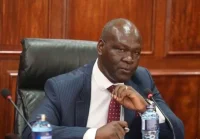The first half of 2020 witnessed suppressed mergers& acquisitions transactions across Africa as investors continue to adopt a wait and see attitude before making key decisions over the COVID-19 pandemic, a new report shows.
The report authored by Financial Market Data and Infrastructure Firm Refinitiv shows that investment banking fees in Sub-Saharan Africa reached an estimated US$64.5 million (Ksh6.93bn) during the second quarter of 2020, half the value recorded during the first quarter of 2020 and the lowest quarterly total since March 2012.
Around US$196.1 million (Ksh21 billion) worth of fees were earned in the region during the first half of 2020, down 27% from last year and a six-year low with fee declines recorded across M&A advisory, debt capital markets underwriting, and syndicated lending. Debt capital markets underwriting fees declined 45% to US$26.2 million (Ksh2.8 billion), marking the lowest first half year total for bond fees in the region since 2016.
Advisory fees earned from completed M&A transactions generated US$43.4 million (Ksh4.6 billion), down 50% year-on-year to the lowest first half level since 2005, while syndicated lending fees fell 36% to a six-year low of US$71.5 million (Ksh7.6 billion). Equity capital markets underwriting fees increased 164% year-on-year to US$55.1 million (Ksh5.9 billion).
Government & Agency fees accounted for 26% of total investment banking fees earned in the region during the first half of 2020, up from 14% during the same period last year.
South Africa generated the most fees in the region during the first six months of the year, a total of US$108.4 million (Ksh11.6 billion) accounting for 55%, followed by Nigeria with 13%. JP Morgan earned the most investment banking fees in the region during the first six months of 2020, a total of US$23.1 million (Ksh2.4 billion) or an 11.8% share of the total fee pool.
As for Mergers and Acquisitions (M&A), the value of announced M&A transactions with any Sub-Saharan African involvement reached US$10.3 billion (Ksh1.1 trillion) during the first six months of 2020, 44% less than the value recorded during the same period in 2019, and a two-year low.
The number of deals declined 18% over the same period. After just US$424.5 million worth of deals were recorded in April, marking the lowest monthly M&A total since October 2005, activity increased for two consecutive months to reach US$3.0 billion in June, a nine-month high.
Deals with a Sub-Saharan African target declined 76% by value to an eighteen-year low of US$3.2 billion, as domestic M&A within the region declined 71% from last year and the combined value of inbound M&A deals reached just US$1.2 billion, the lowest first-half level in more than two decades.
The largest deal involving a Sub-Saharan African target was announced at the end of May – Afrimat’s US$644.3 million acquisition of South African mine operator Unicorn Capital Partners.
Deals in the materials sector accounted for 46% of Sub-Saharan African target M&A activity during the first six months of 2020. South Africa was the most targeted nation, followed by Uganda and Nigeria. Outbound M&A totalled US$3.6 billion during the first six months of 2020, 67% more than the value recorded during the same period in 2019, despite a 22% decline in the number of deals.
With advisory work on eleven deals with a combined value of U$1.7 billion, JP Morgan holds to the top spot in the financial advisor ranking for deals with any Sub-Saharan African involvement during the first six months of 2020.
In the Equity Capital Market space, Sub-Saharan African equity and equity-related issuance totaled US$1.5 billion during the first half of 2020, 16% more than the value recorded during the same period last year, but lower than every other first half total since 2009. The number of deals recorded declined by 29% to the lowest first half tally since 2009.
Only one initial public offering was recorded during the first six months of the year. Malawian telecoms company, Airtel Malawi, raised US$28.7 million on the Malawi Stock Exchange in February. JP Morgan took first place in the Sub-Saharan African ECM underwriting league table during the first six months of 2020.
As for Debt Capital Markets, the African Development Bank raised $3 billion in a “Fight Covid-19” social bond at the end of March to help alleviate the economic and social impact the Coronavirus pandemic will have on livelihoods and economies in the region.
With this deal, and Ghana’s US$3 billion Eurobond in February, Sub-Saharan African debt issuance totalled US$8.9 billion during the first quarter of 2020, the second-highest first quarter DCM total in the region of all-time.
Only US$1.9 billion was raised during the second quarter, taking the value raised during the first six months of 2020 to US$10.7 billion, down 14% from last year and a four-year low. Deutsche Bank took the top spot in the Sub-Saharan African bond underwriter ranking during 1H 2020 with US$1.7 billion of related proceeds, or a 16% market share.













Leave a comment